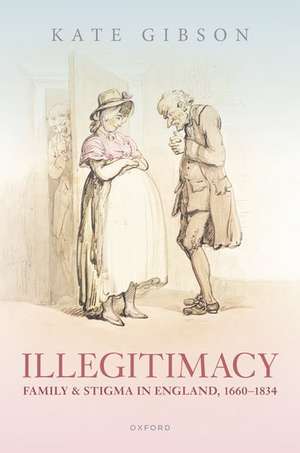Illegitimacy, Family, and Stigma in England, 1660-1834
Autor Kate Gibsonen Limba Engleză Hardback – 4 aug 2022
Preț: 582.53 lei
Preț vechi: 698.43 lei
-17% Nou
Puncte Express: 874
Preț estimativ în valută:
111.47€ • 116.68$ • 92.78£
111.47€ • 116.68$ • 92.78£
Carte disponibilă
Livrare economică 27 februarie-05 martie
Preluare comenzi: 021 569.72.76
Specificații
ISBN-13: 9780192867247
ISBN-10: 0192867245
Pagini: 314
Ilustrații: 10 black and white figures and tables
Dimensiuni: 161 x 240 x 23 mm
Greutate: 0.61 kg
Editura: OUP OXFORD
Colecția OUP Oxford
Locul publicării:Oxford, United Kingdom
ISBN-10: 0192867245
Pagini: 314
Ilustrații: 10 black and white figures and tables
Dimensiuni: 161 x 240 x 23 mm
Greutate: 0.61 kg
Editura: OUP OXFORD
Colecția OUP Oxford
Locul publicării:Oxford, United Kingdom
Recenzii
The book offers a great starting point for further studies to expand on the gendered and racialised experiences of illegitimacy, especially within the context of mobility, migration and displacement.
This is a beautifully produced book and one which provides a rigorous and nuanced picture of the complex lived experience of illegitimate individuals in the long eighteenth centu
fascinating insights...an impressive feat... essential reading for anybody interested in the history of the family, gender, and the social, cultural, and legal contexts of eighteenth-century England.
Approaches the subject in entirely new ways... a sophisticated and meticulous analysis of what it meant to be illegitimate in late Stuart and Georgian England, which will undoubtedly become a core text in the field.
This is a beautifully produced book and one which provides a rigorous and nuanced picture of the complex lived experience of illegitimate individuals in the long eighteenth centu
fascinating insights...an impressive feat... essential reading for anybody interested in the history of the family, gender, and the social, cultural, and legal contexts of eighteenth-century England.
Approaches the subject in entirely new ways... a sophisticated and meticulous analysis of what it meant to be illegitimate in late Stuart and Georgian England, which will undoubtedly become a core text in the field.
Notă biografică
Kate Gibson is a Leverhulme Early Career Fellow in History at the University of Manchester. She is a social historian of family, gender, and sexuality in eighteenth-century Britain, with a particular interest in the relationship between family and social inequality. She studied history at the Universities of Oxford, York, and Sheffield, where she completed a PhD in 2018 funded by the Wolfson foundation. She has held fellowships at the University of Manchester, the University of Edinburgh, the Royal Archives, and the Huntington Library, California.
